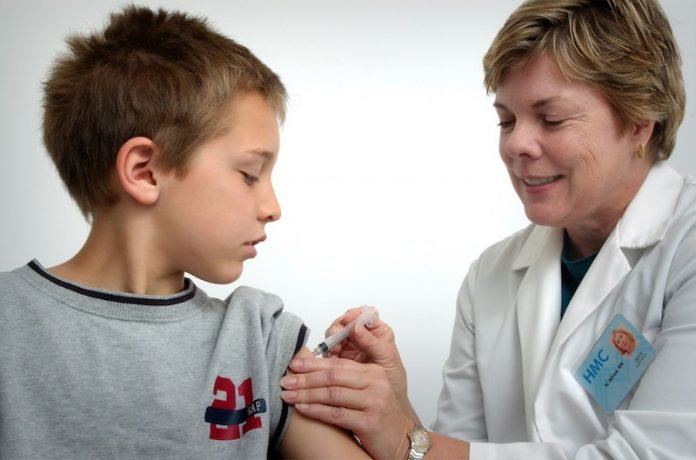
The creation of an effective vaccine is seen as the long-term solution to controlling the COVID-19 pandemic.
Currently, there are more than 100 candidate COVID-19 vaccines in development worldwide.
A recent study from the Beijing Institute of Biotechnology reports that the first COVID-19 vaccine to reach phase 1 clinical trial has been found to be safe, well-tolerated, and able to generate an immune response against SARS-CoV-2 in humans.
The study in 108 healthy adults demonstrates promising results after 28 days—the final results will be evaluated in six months.
Further trials are needed to tell whether the immune response it elicits effectively protects against SARS-CoV-2 infection.
The study is published in The Lancet. One author is Professor Wei Chen.
The new Ad5 vectored COVID-19 vaccine evaluated in this trial is the first to be tested in humans.
It uses a weakened common cold virus (adenovirus, which infects human cells readily but is incapable of causing disease) to deliver genetic material that codes for the SARS-CoV-2 spike protein to the cells.
These cells then produce the spike protein and travel to the lymph nodes where the immune system creates antibodies that will recognize that spike protein and fight off the coronavirus.
The team tested the safety and ability to generate an immune response of different dosages of the new Ad5-nCoV vaccine in 108 healthy adults between the ages of 18 and 60 years who did not have SARS-CoV-2 infection.
Volunteers were enrolled from one site in Wuhan, China, and assigned to receive either a single intramuscular injection of the new Ad5 vaccine at a low dose (5 × 1010 viral particles/0·5ml, 36 adults), middle dose (1×1011 viral particles/1.0ml, 36 adults), or high dose (1.5 x 1011 viral particles/1.5ml, 36 adults).
The researchers tested the volunteers’ blood at regular intervals following vaccination to see whether the vaccine stimulated both arms of the immune system: the body’s ‘humoral response’ (the part of the immune system that produces neutralizing antibodies which can fight infection and could offer a level of immunity), and the body’s cell-mediated arm (which depends on a group of T cells, rather than antibodies, to fight the virus).
The ideal vaccine might generate both antibody and T cell responses to defend against SARS-CoV-2.
The team found the vaccine was well tolerated at all doses with no serious adverse events reported within 28 days of vaccination.
Most adverse events were mild or moderate, with 83% of those receiving low and middle doses of the vaccine and 75% in the high dose group reporting at least one adverse reaction within 7 days of vaccination.
The most common adverse reactions were mild pain at the injection site reported in over half of vaccine recipients, fever, fatigue, headache, and muscle pain.
One participant given the higher dose vaccine reported severe fever along with severe symptoms of fatigue, shortness of breath, and muscle pain—however, these adverse reactions persisted for less than 48 hours.
Within two weeks of vaccination, all dose levels of the vaccine triggered some level of the immune response in the form of binding antibodies (that can bind to the coronavirus but do not necessarily attack it.
Some participants had detectable neutralizing antibodies against SARS-CoV-2.
After 28 days, most participants had a four-fold increase in binding antibodies, and half of the participants in the low- and middle-dose groups and three-quarters of those in the high-dose group showed neutralizing antibodies against SARS-CoV-2.
Importantly, the Ad5-nCoV vaccine also stimulated a rapid T cell response in the majority of volunteers, which was greater in those given the higher and middle doses of vaccine, with levels peaking at 14 days after vaccination.
Further analyses showed that 28 days after vaccination, the majority of recipients showed either a positive T cell response or had detectable neutralizing antibodies against SARS-CoV-2.
The findings show that a phase 2 trial of the Ad5-nCoV vaccine has been initiated in Wuhan to determine whether the results can be replicated, and if there are any adverse events up to 6 months after vaccination, in 500 healthy adults—250 volunteers given a middle dose, 125 given a low dose, and 125 given a placebo as a control.
Copyright © 2020 Knowridge Science Report. All rights reserved.



